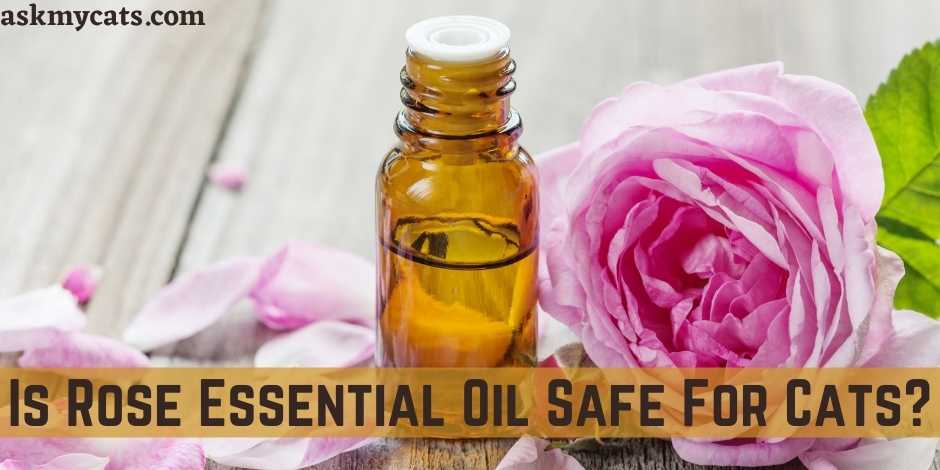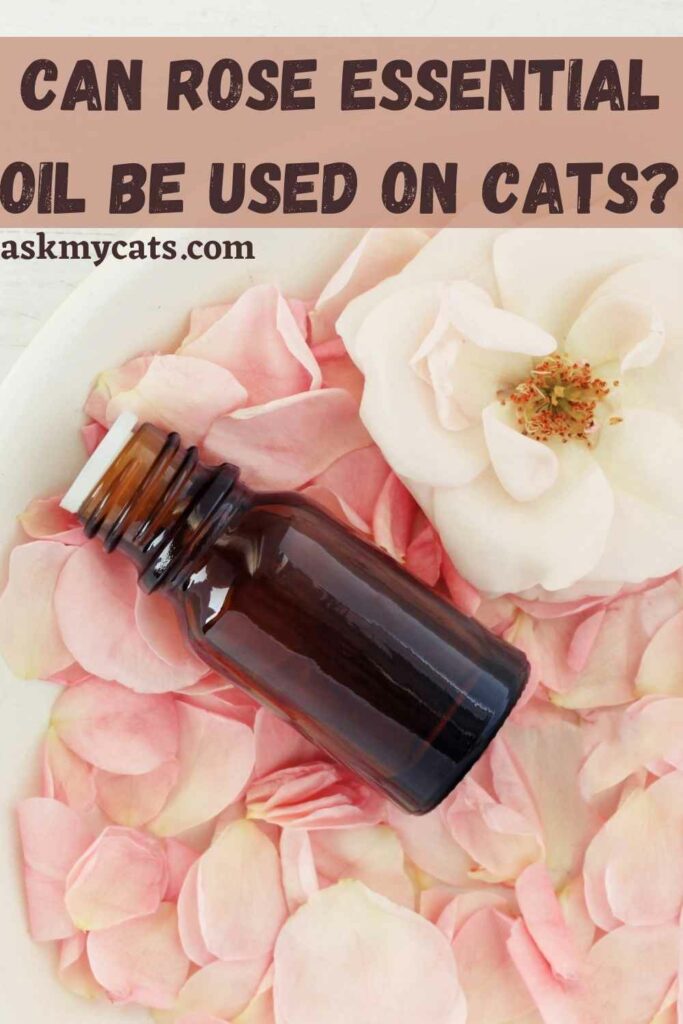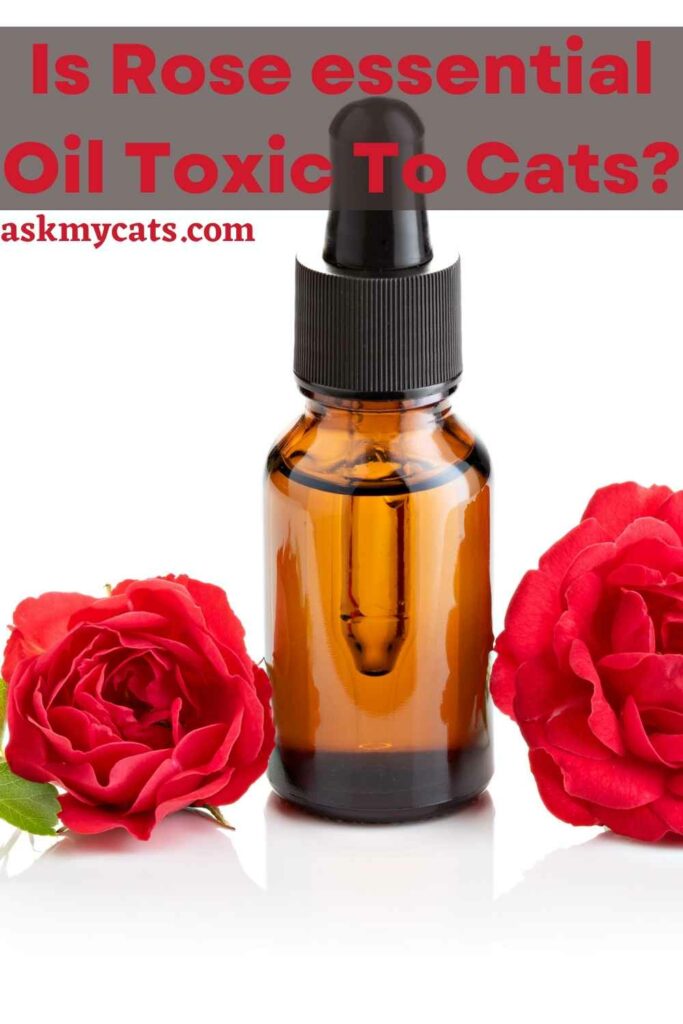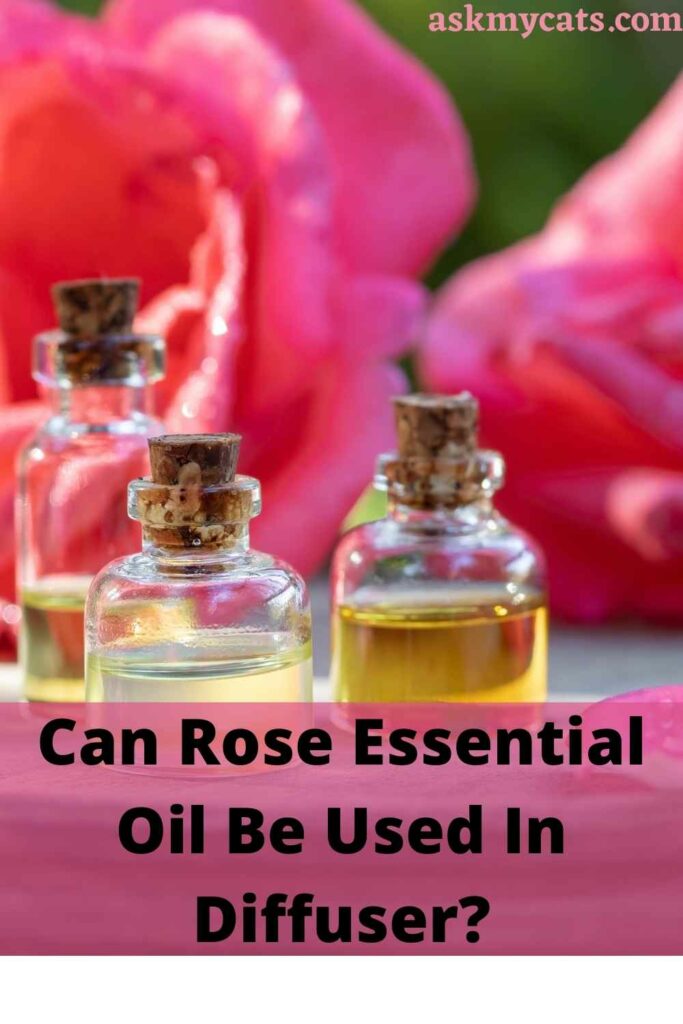In recent years, essential oils have grown in popularity. While they are widely used, there is little information about their health and safety effects, which is often contradictory. This is especially true when talking about how they affect cats.
Essential oils are misunderstood, as are the precautions that must be taken to ensure that they do not harm pets. Essential oils come in a variety of forms, each with its own set of physical and chemical properties.
So, is rose essential oil safe for cats?
No, rose essential oil is not safe for cats. The essential oil is far too strong to use around cats in its concentrated form. If they consume the oil, it could be fatal, and diffusing or using it in any other way around them could also make them sick.
This article will talk about is rose essential oil is safe for cats and can you use rose essential oil around cats.


Give Your Cat the Perfect Day
Get the Free Ebook!
What Is Rose Essential Oil?
Rose oil is the essential oil extracted from the petals of various types of rose.
Rose ottos are obtained by steam distillation, whereas rose absolutes are obtained by solvent extraction, with the absolute being more commonly used in perfumery.
Persia was the birthplace of the manufacturing technique. Rose oils are perhaps the most widely used essential oil in perfumery, despite their high price and the advent of organic synthesis.
The most common chemical compounds present in rose oil are:
- citronellol
- geraniol
- nerol
- linalool
- phenyl ethyl alcohol
- farnesol
- stearoptene
- α-pinene
- β-pinene
- α-terpinene
- limonene
- p-cymene
- camphene
- β-caryophyllene
- neral
- citronellyl acetate
- geranyl acetate
- neryl acetate
- eugenol
- methyl eugenol
- rose oxide
- α-damascenone
- β-damascenone
- benzaldehyde
- benzyl alcohol
- rhodinyl acetate
- phenyl ethyl formate.
Can Rose Essential Oil Be Used On Cats?
No, rose essential oil should not be used on cats.

Rose essential oil does not have a known toxic dose, according to experts. It depends on the sensitivity of each cat and the route of exposure.
Within the first three hours of exposure or ingestion, your cat may develop gastrointestinal symptoms.
However, according to experts, liver or kidney damage can take several days to show up on blood tests.
If your cat has ingested rose oil you can see the following symptoms: –
- Drooling
- Gastrointestinal signs such as vomiting and diarrhea
- Inappetance (refusal to eat)
- Lethargy
- Neurological signs such as staggering, stuporous or drunk like behavior, and tremors
- Decreased respiratory rate, asthma, or aspiration pneumonia
- Changes to heart rate/rhythm
- Liver failure
According to experts, inhaling essential oils can cause aspiration pneumonia. Aspiration pneumonia is a lung infection caused by foreign material being inhaled into the lungs of a cat. Regurgitation or vomiting are the most common symptoms.
If you notice your cat has come into contact with a rose essential oil, experts advise bathing your cat as soon as possible to remove as much of the product as possible.
The next step is to contact the ASPCA’s poison control hotline (888-426-4435) at any time of day or night for more information about the case.
They’ll be able to tell you whether it’s safe to keep an eye on your cat at home or if you should go to the nearest vet right away, as well as what steps to take next.
After coming into contact with rose oil/spray/diffuser, your cat may experience respiratory changes such as rapid breathing, coughing, and/or watery eyes. It is recommended that you move your cat to a fresh air environment and contact your veterinarian.
Is Rose essential Oil Toxic To Cats?
Yes, rose essential oil is toxic to cats.

Essential oils are organic plant constituents that are volatile and contribute to fragrance and flavor.
Plants are extracted by distillation or cold pressing. Insecticides, aromatherapy, personal care products (such as antibacterials), flavorings, herbal remedies, and liquid potpourri are all examples of how essential oils are used.
Rose essential oils can be toxic to pets, especially cats. They are absorbed quickly both orally and through the skin before being metabolized in the liver.
Cats’ livers lack an essential enzyme, making it difficult for them to metabolize and eliminate toxins like essential oils.
Cats are also highly sensitive to phenols and phenolic compounds found in essential oils.
The higher the concentration of essential oil, the more dangerous it is for the cat.
Depending on the amount of exposure, symptoms may include drooling, vomiting, tremors, ataxia (wobbliness), respiratory distress, low heart rate, low body temperature, and liver failure.
If you notice any of these symptoms, take your cat outside immediately and to a veterinary emergency center if the symptoms do not improve quickly. A low heart rate, low blood pressure, and signs of liver failure may be noted by the veterinarian.
The greater the risk to your cat, the higher the essential oil concentration. Take your cat to the veterinarian right away if he or she inadvertently consumes any oils.
Rose essential oils that come into direct contact with a cat’s skin are absorbed. Inhaling diffused oils in the air can cause respiratory problems.
They can also build up on your cat’s fur, causing him to eat them while licking and cleaning. Toxicity can strike suddenly or develop gradually over time.
Do Cats Like The Scent Of Rose Essential Oil?
Whether or not a cat enjoys the scent of rose essential oil is wholly reliant on the cat and its personality.
The scent of rose oil isn’t one of the most popular scents that cats dislike, nor is it one of the most popular scents that cats prefer.
This can be brought to light by using rose oil in your home or near your cat. Examine the diffuser to see if your cat is purring and moving around. If this is the case, your cat will enjoy the scent of rose oil.
Can Rose Essential Oil Be Used In Diffuser?
No, rose essential should not be oil be used in a diffuser.

Many essential oils, including rose oil, are toxic to cats. These are toxic, whether applied to the skin or used in diffusers.
Because it uses water vapor to diffuse tiny oil droplets into the air, diffuser oil can still be harmful.
If the diffuser is used in a small space or for a long time, inhaling diffused rose oil can cause aspiration pneumonia and other toxic effects.
If you plan to use a diffuser in your home, keep it out of reach of your cat and consult your veterinarian about which oils are safe to use.
However, if your cat has breathing issues, using a diffuser throughout the house is not a good idea.
If you have kittens or curious cats, you might want to think twice about using an oil diffuser.
Inhaled toxins have a negative effect on cats because their respiratory systems are so sensitive. Diffusers have been known to be knocked over by curious kittens, spilling the oil.
If the oil gets on the cat’s fur or if the cat licks the spill, toxic effects can occur.
If you want to use rose essential oil you must dilute it first. Rose oil for cats should be diluted with 9 parts carrier oil and 1 part rose oil.
Before using a rose essential oil topically on your cat, always consult your veterinarian. This will keep you from using a product that could harm your four-legged friend by accident.
Rose oil is also toxic to cats and should not be given to them. This means you shouldn’t put it on your cat’s legs or paws, as it might get licked.
It’s also important to note that these oils must be diluted first. Use a carrier oil that you know is safe for cats, and if you have any questions, seek professional help.
Most cat-friendly oils require at least 1 drop of pure rose essential oil to 50 drops of pure carrier oil for proper dilution. When inhaled, even the gentlest essential oils can irritate the airways.
Frequently Asked Questions
What are essential oils?
Can rose oil kill cats?
Can cats breathe in a rose essential oil?
Final Words
Rose isn’t the most toxic substance, but it’s also not something your cat needs. Keep your four-legged friend away from the essential oil in particular. It’s an effective natural flea repellent, but you should probably apply it to your carpets and furniture rather than your cat.
Ask us in the comments section if you have any unanswered questions.
